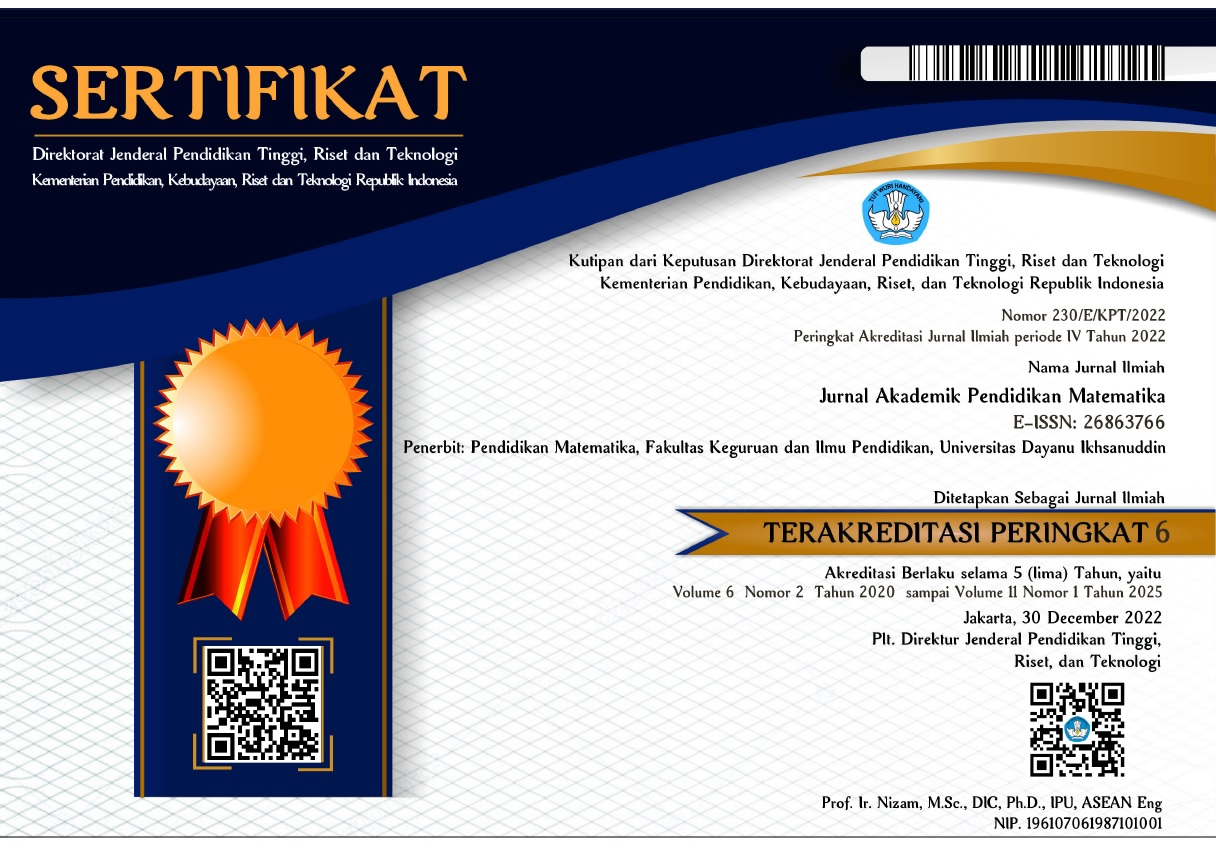Analisis Penggunaan Gamifikasi EducaPlay sebagai Alat Evaluasi Pembelajaran Matematika: Eksplorasi Respon Mahasiswa
DOI:
https://doi.org/10.55340/japm.v11i1.1785Keywords:
gamification, educaplay, learning evaluation, fundamental of mathematicsAbstract
This study aims to analyze the use of EducaPlay gamification as an evaluation tool in learning mathematics in higher education. Using a qualitative approach and case study design, this research explores students' responses to the use of EducaPlay to evaluate their understanding in the foundations of mathematics course. Data were collected through in-depth interviews and classroom observations of 21 Makassar State University students involved in the use of the EducaPlay platform in the foundations of mathematics course. Furthermore, the data were analyzed descriptively qualitatively. The results showed that students responded positively to gamification in the evaluation of learning the foundations of mathematics. The use of EducaPlay increases motivation, engagement, and understanding of the material, and reduces anxiety related to conventional evaluation. However, there were some technical issues, such as internet connection problems that affected the learning experience. Overall, the results of this study conclude that EducaPlay can be an effective evaluation tool, provided technical issues can be overcome. This research suggests that the use of gamification in mathematics learning evaluation can be expanded to enhance students' learning experience in a more interactive and fun way.
Downloads
References
Agdiyah, A. F., Mustopa, S., & Kowiyah. (2024). Pengaruh Media Interaktif Educaplay pada Pembelajaran Matematika di Kelas III SD. Jurnal Arjuna : Publikasi Ilmu Pendidikan, Bahasa Dan Matematika, 2(6), 385–390. https://doi.org/10.61132/arjuna.v2i6.1367
Anwar, S., & Jasiah, J. (2024). Pengembangan Media Pembelajaran Berbasis Game Educaplay untuk Meningkatkan Keaktifan Siswa pada Mata Pelajaran SKI. Jurnal Budi Pekerti Agama Islam, 3(1), 355–373. https://doi.org/10.61132/jbpai.v3i1.913
Azizah, A., & Ayuni, M. N. (2024). Peningkatan Hasil Belajar Siswa melalui Educaplay pada Materi “Tanda Seru” Kelas 2 SD Negeri Plaosan. MASALIQ, 5(1), 192-202. https://doi.org/10.58578/masaliq.v5i1.4521.
Baharuddin., Zaki. A., Khadijah., & Asmaun. (2024). Training to Prove the Area of Circle using Manipulative Media through Mathematics Learning Assistance. Mattawang: Jurnal Pengabdian Masyarakat. 5(2). 32-36. https://doi.org/10.35877/454RI.mattawang2770
Fortilla, Z. A., & Al-Ghazali, T. A. (2025). Game Edu IT: Combining Technology Literacy with an Interactive Approach. Gameology And Multimedia Expert Journal, 2(1),17-22, https://doi.org/10.29103/game.v2i1.20334
Garcia-Iza , D. ., García-García , W. ., Guerrero-Haro , E. ., & Yánez-Cando , X. (2024). Educaplay como recurso de evaluación formativa para el aprendizaje de las matemáticas en la educación básica superior. 593 Digital Publisher CEIT, 9(4), 497-515. https://doi.org/10.33386/593dp.2024.4.2534
Halachev, P. (2024). Gamification as an e-learning tool: A Literature Review. E-Learning Innovations Journal, 2(2), 4–20. https://doi.org/10.57125/ELIJ.2024.09.25.01
Nikolova, A., Georgiev, V., & Mitreva, E. (2024). Evaluation of Achievement Badges as a Gamification Method for Increasing Motivation in e-Learning. Digital Presentation and Preservation of Cultural and Scientific Heritage, 14, 241–248. https://doi.org/10.55630/dipp.2024.14.22
Parkin, J. (2023). Enhancing student understanding through playful learning using Playmobil pro. Compass: Journal of Learning and Teaching in Higher Education, 16(2), 63–72. https://doi.org/10.21100/compass.v16i2.1436
Rahmadiah, A., & Handican, R. (2023). Bagaimana evaluasi yang efektif dalam pembelajaran matematika: tinjauan persepsi guru matematika. Griya Journal of Mathematics Education and Application, 3(2), 357-371. https://doi.org/10.29303/griya.v3i2.332
Rahmat, P. S., Jumantini, E., Suryani, Y., Satriapraja, N., & Suhenda, E. (2024). The impact of utilizing educational games-based technology as learning media on students' numeration skills in high school economics subjects. Jurnal Penelitian Pendidikan Indonesia, 10(4), 780-790, https://doi.org/10.29210/020243825
Rahmayanti, J. D., Lailiyah, S., & Setiaputri, A. N. (2024). The Effect of Educaplay-Based Interactive Quiz on Students’ Learning Interest and Learning Outcomes in Elementary Schools. AULADUNA: Jurnal Pendidikan Dasar Islam, 11(2), 175-189. https://doi.org/10.24252/auladuna.v11i2a6.2024
Solis, E. N. G., Garcia, G. D. L., Parejo, E. E. V., & Chávez, E. C. (2025). Educaplay: Un diseño para la mejora del Aprendizaje de Ciencias Naturales en 10mo Año. Sapientia Technological, 6(1), 41–61. https://doi.org/10.58515/035RSPT
Suchkov, M., Bekturgan, B., & Kartbayev, A. (2024). Gamification Effects on Employee Engagement and Business Process Risk Evaluation, IEEE 4th International Conference on Smart Information Systems and Technologies (SIST), Astana, Kazakhstan, 2024, pp. 594-599, doi: 10.1109/SIST61555.2024.10629629.
Zheng, Z., Yang, Z., & Liu, H. (2024). Evaluation of Mathematical Interdisciplinary Learning Based on an Improved SOLO Classification Method. Asian Journal of Education and Social Studies 50 (12):470-81. https://doi.org/10.9734/ajess/2024/v50i121715


























